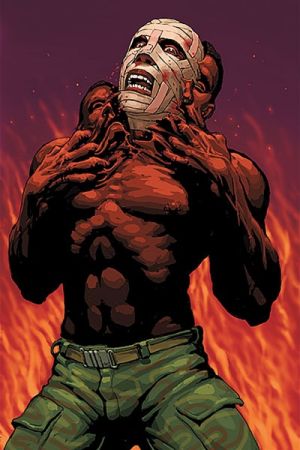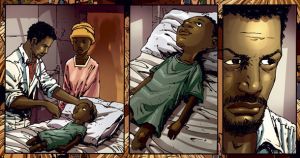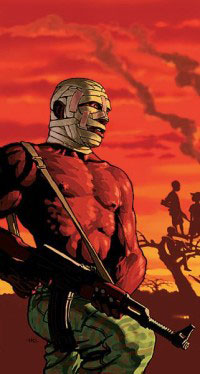Unknown Soldier: The Dysart Interview Pt. 3
By Beth Davies-Stofka
February 25, 2011 - 04:19
In yesterday's installment of our multi-part interview with writer Joshua Dysart, we explored the creative origins of Dr. Moses Lwanga, the main character in Dysart's 2008 revival of Unknown Soldier. Today, we discuss Lwanga's sanity, and what it might mean to question it.
I’d love to talk about Moses Lwanga’s sanity. [Dysart laughs out loud] I don’t know what to make of his state of mind. I mean, I don’t think I could hold it together if I went through what he did. I can totally see him losing it, hearing voices, cutting his own face, it’s a dreadful moment and completely understandable. Is he actually out of his mind?
 |
So if I had asked you, “Is his state of mind allegorical,” the answer would have been “yes.”
Yes! It’s all allegorical, except for his name. [lots of laughter]
To me he has a kind of “cracked” sanity, where you’re just not really sure where he stands. I guess you could say that there’s two extremes in everybody’s life, between sanity and insanity, and most of us live somewhere along a spectrum, and perhaps we slide around a bit.
Absolutely! It’s kind of a positive accident that this turned out to be such a great narrative device. It’s been interesting because now we’ve essentially got a character who, for the most part, you’re not really sure what he’s going to do next. And that’s been really great. But ultimately, it’s really just an extreme example of my own conflict. You know, they asked me to write a war book. I am politically, ideologically and spiritually opposed to the notion of organized conflict. But I myself over the years have had that view challenged. It’s very complex.
 |
 |
Ah, so I guess you probably have a sense that for a lot of people who look at the Uganda conflict, that war happens in everybody’s own heart. As in, “I must resist nonviolently, there is no way to peace, peace is the way, and yet I just want to go kill that [insert gross expletive],” you know?
Yeah, yeah, no, exactly! That’s the thing. Kony engenders hatred in the kindest and most gentle of people. It’s amazing!
So what separates Moses from Joseph Kony?
Oh, that’s an excellent question. I don’t know. I really don’t know. That’s an endless discussion. I mean, I guess if I were to defend Moses (and sometimes I don’t feel like defending him), I would say that his intentions are to heal, and not to destroy, but maybe Kony feels that way too. So I can’t really answer that question. I think there are times when Moses is very much like Joseph Kony.
Next time, we’ll discuss religion in Unknown Soldier. See you Monday!
Related Articles:
Unknown Soldier: The Dysart Interview Pt. 7
Unknown Soldier: The Dysart Interview Pt. 6
Unknown Soldier: The Dysart Interview Pt. 5
Unknown Soldier: The Dysart Interview Pt. 4
Unknown Soldier: The Dysart Interview Pt. 3
Unknown Soldier: The Dysart Interview Pt. 2
Unknown Soldier: The Dysart Interview Pt. 1
Unknown Soldier #25: Final Issue
Unknown Soldier #24
Unknown Soldier #21
